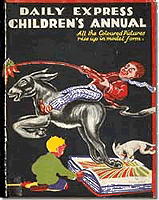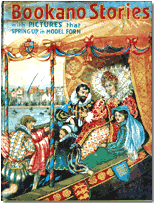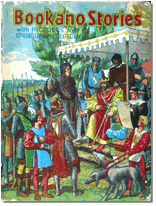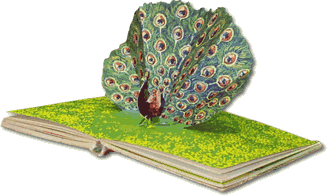 |
World War
I ended the golden age of movable books. The contribution of German artists,
which was so prominent in previous century, came to a halt. The English
and Americans lacked the print shops and skilled labor necessary to create
the fine chromolithography of the Germans. As a result, movable books declined
in quality and quantity.
Movables
experienced a renaissance in the 1930s and 1940s, thanks to S. Louis Giraud
in London. While editor of children's books for the newspaper, Daily
Express, Giraud designed and produced a pop-up annual by the same name.
After he left the newspaper, he continued the series under the title
Bookano Stories. From 1929 to 1949, Giraud produced sixteen annuals
using the name Strand Publications and Bookano Stories. His books were referred
to as "living models" because each scene unfolded in a double-page spread,
which was designed to be viewed from multiple angles, much like many modern
pop-up books. An added attraction was that the actions appeared to continue
after the page was opened. A good example of this is from the Daily Express
annual for 1930. A circus clown magically swings around a bar.
 
View video
Giraud, S. Louis, ed. The Daily Express Children's
Annual: Introducing Self-erecting Models to Illustrate the Stories.
No. 2. London: The Lane Publications (Daily Express Books Dept.), [1930].
Unlike the early German masterpieces, which were very
expensive, Giraud created and sold his annuals for modest prices. He used
a photolitho printing process, which lacked the detail and refinement
of German chromolithography. However, his productions are appealing for
their bright colors and originality, and are very collectible in today's
market.
|

|

|
|
Giraud, S. Louis, ed. Bookano Stories with Pictures That Spring
Up in Model Form. No. 4. London: Strand Publications, [1937].
|
|

|
|
|

Giraud, S. Louis, ed. Bookano Stories with Pictures That Spring
Up in Model Form. No. 9. London: Strand Publications, [1942].
|
|
|

